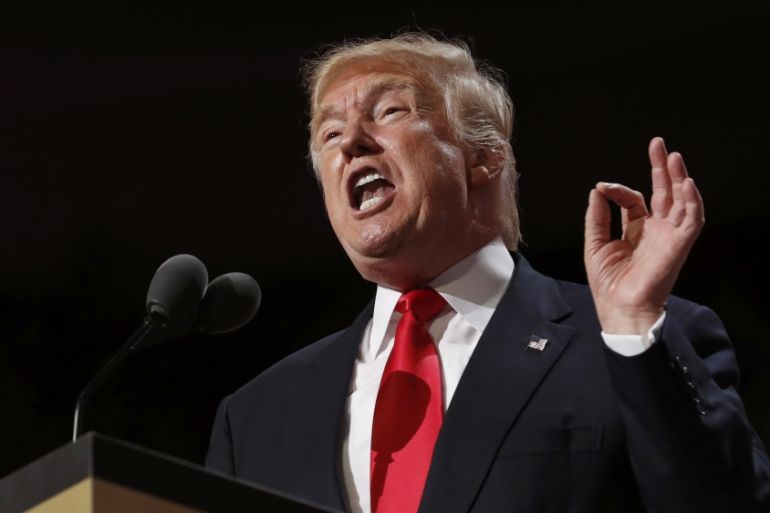Trump’s speech: A dystopian view of America
Acceptance speech reflects how Trump has tapped into widespread anger and fear among white working-class men.

After four days that were anything but, at least the end of the Republican National Convention was traditional.
The nominee was joined on stage by his family, the balloons dropped, the confetti fluttered around the hall and people headed off cheering.
Keep reading
list of 4 itemsDonald Trump attends first day of ‘hush money’ criminal trial
What is Donald Trump’s ‘hush money’ trial all about?
In Trump’s New York ‘hush money’ case, prosecutors push election angle
There was no showbiz entry for Donald Trump. He walked on stage like a man ready to get down to business.
In the most important speech of his life, he spoke for 75 minutes. It was the longest acceptance speech in more than 40 years and he covered a lot of ground.
This was a dystopian view of America, a country under siege from enemies within and under threat from abroad.
Immigrants were arriving to take jobs and commit crimes. ISIL was sending “militants” to wreak havoc while the country was struggling with “third-world airports” and crumbling roads and bridges.
Trump repeated his assertion that he would build a “great border wall”. Even though supporters in recent days – including former Texas Governor Rick Perry – claimed the wall was metaphorical. New security measures, border patrols and drones would do the job Donald Trump outlined.
‘America first’
Trump insisted his credo would be “America first”. He bucked Republican orthodoxy, saying he would steer the country away from multinational trade agreements but would seek agreements with individual countries.
WATCH: Will Donald Trump win the US presidential election?
He dismissed NAFTA, the North American Free Trade Agreement linking the US, Canada and Mexico, and warned he would renegotiate it or simply rip it up.
He blamed Bill Clinton for signing the deal, ignoring the fact it had been drafted by a Republican President, George H W Bush, who failed to push it through before the end of his sole four-year term.
“We will never sign bad trade deals,” said the businessman and former reality TV show star.
The speech also gave him the chance to attack his Democratic rival Hillary Clinton. He laid the turmoil in Libya and Egypt at her feet, blamed her for not doing enough to stop the ongoing civil war in Syria and her willingness to accept thousands of Syrian refugees.
She was, in his eyes, to blame for the rise of ISIL. The legacy of Hillary Clinton was “death, destruction, terrorism and weakness,” he told delegates to resounding cheers.
‘I am your voice’
And in four words, Trump captured the reason for his unexpected and unlikely political rise: “I am your voice”. There is no doubt he has tapped into widespread anger across the United States, particularly among white working-class males who feel cheated, excluded and abandoned.
“I have joined the political area so that the powerful can no longer beat up on people that cannot defend themselves.” He added: “Nobody knows the system better than me, which is why I alone can fix it.”
Trump also hammered hard to the idea that he is a “law and order” candidate, someone who will end the violence on America’s streets.
READ MORE: Donald Trump’s Republican party – not divided
And that is part of the Trump dilemma. For months his campaign has been saying he will start to detail how he will do things: how he will bring jobs back to the US; how in an interconnected global economy he will stop companies taking their manufacturing elsewhere; how he will beat ISIL without sending thousands of American troops in the new Middle East war.
He did not put the flesh on the bones in his speech.
Mixed reaction
The immediate reaction to Trump’s performance was mixed. I saw one man in tears on the convention floor, applauding long and loud. I spoke to one man who still wasn’t convinced by what he heard. “How is he going to do this?” One respected Republican wrote that the party as she knew it died in the hall on Thursday.
Trump was hoping for record viewing figures for his speech. He didn’t get that. He was hoping for a bump in the polls. Initial returns suggest that has eluded him too.
Trump is different. He is not a politician. He’s promising to do things differently. And political scientists will tell you the candidate who offers change tends to win elections.
If Donald Trump, with his character, his business record, his inconsistencies, becomes the entire focus of this election, he will lose.
But if he can keep attention on Hillary Clinton, convince people she is more of the same, then America might be welcoming a very different kind of President in January 2017.